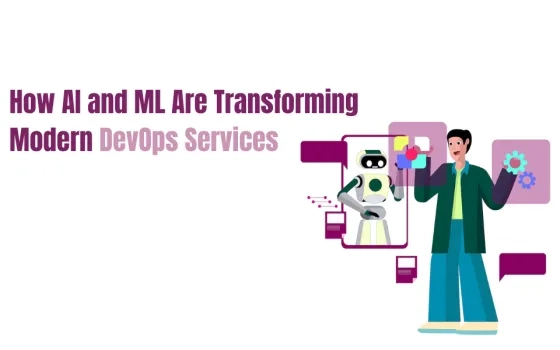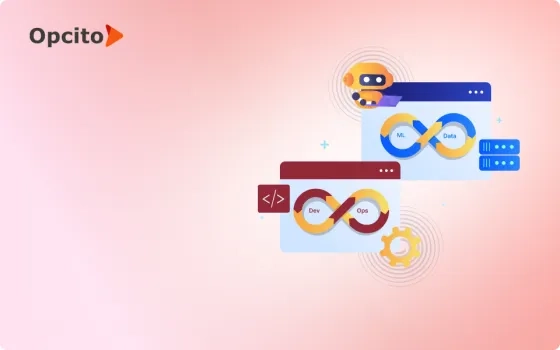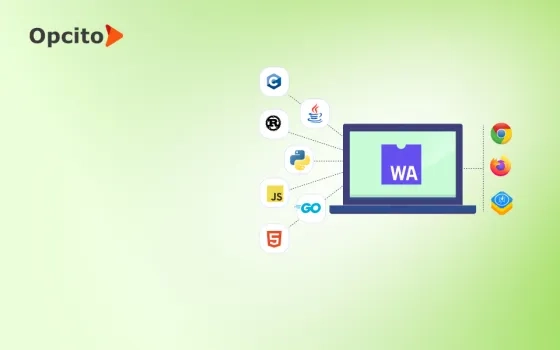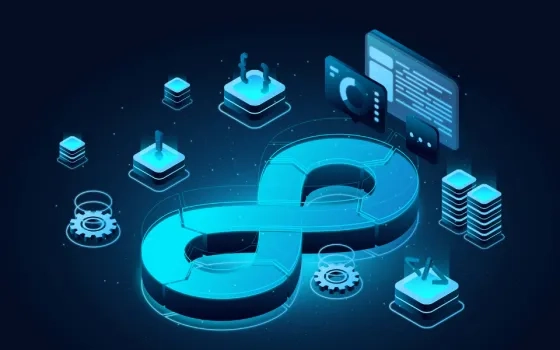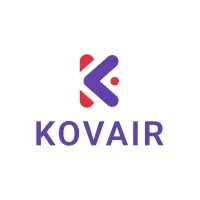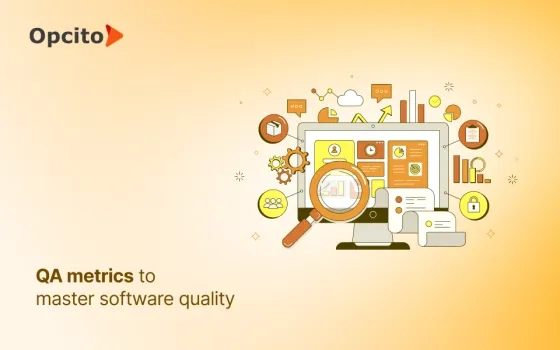When DevOps first emerged, its promise was simple yet revolutionary—breaking down silos between development and operations to enable faster, more reliable software delivery. Over the past decade, DevOps has become mainstream across enterprises. Yet as digital complexity grows, traditional DevOps practices are now hitting new limits.
Enter AI and Machine Learning (ML). These technologies are fundamentally reshaping the next era of DevOps services, helping enterprises move beyond manual processes and reactive monitoring toward predictive, intelligent, and fully automated software delivery pipelines.
For CTOs and engineering leaders, understanding how AI and ML are transforming DevOps is no longer optional. It is now a strategic imperative to stay competitive, deliver higher-quality digital experiences, and scale innovation.
In this article, we’ll explore how modern enterprises are embedding AI/ML across their DevOps pipelines—and why partnering with an expert Python Software Development Company can accelerate this transformation.
Why AI-Driven DevOps Is the Future?
Enterprise software ecosystems today are more complex than ever.
Applications are distributed across multi-cloud environments, rely on microservices architectures, and must operate at a global scale with high resilience. Development teams are expected to deliver continuous updates while maintaining performance, security, and compliance.
Traditional DevOps approaches—while a major step forward—often struggle to keep pace with these demands. Manual monitoring and rule-based alerting can lead to noise fatigue. Static release pipelines are prone to bottlenecks. Reactive security processes expose vulnerabilities too late.
AI and ML address these challenges head-on, enabling what many now call AIOps or intelligent DevOps services. By applying advanced data analytics, pattern recognition, and automation across the software delivery lifecycle, enterprises can achieve:
- Proactive incident prevention and self-healing systems
- Intelligent release orchestration and quality assurance
- Predictive performance optimization
- AI-driven DevSecOps for continuous security assurance
The result is a DevOps ecosystem that is not only faster and more scalable, but also far more intelligent and resilient.
Key Ways AI and ML Are Enhancing DevOps Services
Let’s dive deeper into how AI/ML is transforming specific aspects of modern DevOps services:
1. Intelligent Monitoring and Alerting
Traditional monitoring tools rely heavily on static thresholds and predefined alerts—leading to both missed anomalies and high volumes of false positives.
AI-powered monitoring systems, on the other hand, continuously learn from system behavior. They can identify subtle patterns, detect anomalies in real-time, and automatically correlate events across complex environments.
This enables:
- Smarter alerting reduces noise and highlights critical issues.
- Proactive detection of potential failures before they impact users.
- Anomaly prediction that enables preemptive remediation actions.
For example, a global eCommerce enterprise used AI-driven monitoring to cut false-positive alerts by 80%—allowing SRE teams to focus on truly impactful incidents.
2. Self-Healing Systems
AI/ML models can go beyond detecting issues—they can also enable systems to self-correct.
By learning from historical incident data and system states, AI agents can automatically trigger remediation workflows such as scaling resources, restarting services, or adjusting configurations.
Leading DevOps services now incorporate self-healing capabilities across cloud infrastructure, application layers, and CI/CD pipelines—reducing downtime and improving system resilience.
3. Intelligent Release Automation
Releasing software at an enterprise scale is no small feat. Coordinating deployments across hundreds of microservices while ensuring stability and quality requires more than basic CI/CD pipelines.
AI-driven release orchestration introduces several game-changing capabilities:
- Automated risk scoring of builds based on test results, code quality metrics, and historical defect patterns.
- Predictive deployment strategies (e.g., canary, blue-green) optimized based on real-time traffic and system health data.
- Dynamic rollback mechanisms are triggered automatically when performance degradation is detected.
A trusted Python Software Development Company can build these intelligent release pipelines using Python’s rich ML ecosystem—enabling continuous, safe delivery of high-quality software.
4. Predictive Performance Optimization
AI/ML models can analyze vast amounts of observability data to surface optimization opportunities proactively.
For example, they can predict when:
- Application response times will degrade due to traffic spikes.
- Infrastructure scaling will be needed based on seasonal demand patterns.
- Certain microservices may become bottlenecks due to architectural inefficiencies.
By surfacing these insights proactively, AI-driven DevOps services enable engineering teams to optimize system performance continuously, rather than reactively firefighting issues in production.
5. AI-Driven DevSecOps
Security remains one of the most critical—and challenging—areas of modern software delivery.
AI-powered DevSecOps tools are helping enterprises shift security left and automate risk mitigation:
- AI-based static and dynamic code analysis identifies vulnerabilities earlier in the pipeline.
- ML models detect unusual access patterns and potential security breaches in real-time.
- AI-driven threat intelligence continuously updates security policies based on evolving global threat landscapes.
By embedding intelligent security into every phase of DevOps, enterprises can build inherently secure software without slowing down delivery velocity.
The Role of Python in AI-Driven DevOps
While many technologies contribute to AI/ML adoption in DevOps, Python plays an especially strategic role.
Python’s dominance in the AI/ML space—thanks to libraries like TensorFlow, PyTorch, Scikit-learn, and Pandas—makes it the language of choice for building intelligent DevOps solutions.
Moreover, Python’s interoperability with DevOps toolchains (Jenkins, Kubernetes, Docker, Prometheus, Grafana, etc.) enables seamless integration of AI models into CI/CD pipelines, observability platforms, and automation frameworks.
Partnering with a skilled Python Software Development Company provides enterprises with the ability to:
- Build custom AI models tailored to their unique DevOps needs.
- Integrate AI-driven capabilities into existing DevOps tools and processes.
- Continuously evolve and retrain models based on new data and changing environments.
This blend of AI excellence and DevOps engineering is critical for enterprises seeking to lead in the next generation of intelligent software delivery.
Real-World Impact: AI-Driven DevOps in Action
Across industries, forward-looking enterprises are already seeing transformative results from AI-powered DevOps services.
A global fintech company used AI-driven observability to reduce Mean Time to Detection (MTTD) by 70% and Mean Time to Resolution (MTTR) by 50%.
A healthcare platform implemented intelligent release automation, achieving a 5x increase in deployment frequency without increasing production incidents.
A leading logistics enterprise leveraged AI-powered DevSecOps to detect and remediate 95% of security vulnerabilities during pre-production phases, drastically improving software quality and compliance.
These outcomes are not isolated. They represent the new frontier of enterprise DevOps—and the competitive edge AI/ML now delivers.
Conclusion: The Future of DevOps Is Intelligent
In 2025 and beyond, the bar for enterprise software delivery will continue to rise. Speed, quality, resilience, and security must all improve simultaneously, and manual DevOps practices alone won’t be enough.
AI-driven DevOps services represent the future: intelligent pipelines that adapt, learn, and optimize continuously.
But success requires more than adopting AI tools off the shelf. It demands deep integration of AI/ML into DevOps architectures, tailored to each enterprise’s unique systems and goals.
The enterprises that act now—embedding AI at the core of their DevOps strategy—will not only deliver better software. They will lead the digital markets of tomorrow.



